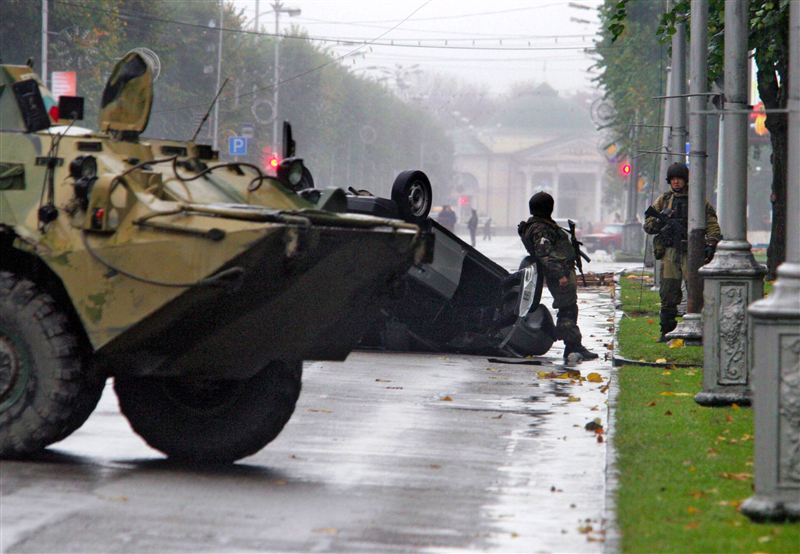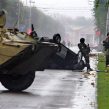
Security in Kabardino-Balkaria Fails to Improve After Reappointment of President
Publication: Eurasia Daily Monitor Volume: 7 Issue: 165
By:

On September 11, a police armored truck and a gas pipeline were blown up in the Elbrus district, located in the mountainous part of Kabardino-Balkaria. The attack left five servicemen injured and several settlements without gas supplies (ITAR-TASS, September 11). The strength of the blast was estimated at 10-12 kilograms of TNT (RIA Novosti, September 11). That same night, a war memorial was blown up in the same area of Kabardino-Balkaria (www.kavkaz-uzel.ru, September 11). Local insurgents claimed responsibility for both attacks (www.islamdin.com, September 11).
On September 8, a federal judge in the Baksan district of the republic was gunned down in front of his house (Interfax, September 8). The Kabardino-Balkarian insurgents’ website took responsibility for this event too, even though the source did not explain why that particular judge was singled out. Earlier in September, two insurgents were reported to have been killed by the police. However, the insurgents responded by killing one policeman.
Both the republic’s president Arsen Kanokov and the Russian president’s envoy to the North Caucasus, Aleksandr Khloponin, have explained the rapid destabilization that has hit Kabardino-Balkaria especially hard in 2010 due to an ongoing power struggle. Kanokov’s first five-year presidential term is expiring in September 2010 and, according to him, some people are eager to show to the Kremlin that he is not in control of the situation in the republic (www.kavkaz-uzel.ru, July 22).
On August 23, President Dmitry Medvedev reappointed Kanokov as the head of Kabardino-Balkaria and on September 1 the republican parliament formally accepted Medvedev’s appointment, with 53 votes in favor and 4 abstaining (www.kavkaz-uzel.ru, September 1). However, hopes that fighting in the republic would end as soon as Russia’s leadership made up its mind on the candidacy of the republican president were dashed by continuing violence.
Valery Kardanov, a Kabardin businessman who made a fortune on oil supplies and headed the regional subsidiary of Rossneft, was seen as Kanokov’s main rival. Kardanov allegedly supported hunger strikes by republican ethnic minority Balkars in Moscow and Yessentuki, where Khloponin has his headquarters, in July and August. But even the Balkar movement did not die out after Kanokov was reappointed. In fact, on August 31 Balkar representatives decided to call for a major rally by their people to proclaim secession from Kabardino-Balkaria and the establishment of a separate Balkar republic (www.kavkaz-uzel.ru, September 1).
The sudden resurgence of the Turkic-speaking Balkar minority in the republic may be linked to heightened activism of the Kabardin (aka Circassian) majority. One telling sign of Moscow’s support for the Balkar activists came on July 28, when Russia’s Supreme Court overturned a decision by Kabardino-Balkaria’s Supreme Court to ban the Balkar People’s Council of Elders for extremism (Kommersant-Daily, July 29). Normally, Moscow prefers to support one major people in a region, giving it largely the power to govern everybody else, including significant ethnic Russian segments of their populations. With Circassian political activism in the northwestern Caucasus and abroad is growing and threatening the 2014 Olympics to be held in Sochi, Moscow appears to be playing off the non-Circassian ethnic groups against the Circassians in order to rein in the latter. The Circassians are demanding that the Sochi Olympics be moved to another location and that Russia compensate them for the losses they suffered at the hands of the Tsarist army in the 19th century. Meanwhile the website of the militant insurgency in Kabardino-Balkaria and Karachaevo-Cherkessia, Islamdin.com, does not indicate that there are ethnic divisions, given that it bills itself as “the United Vilayat of Kabarda, Balkaria and Karachai” within the broader Caucasus Emirate (www.islamdin.com)
Local experts believe, despite some improvements in economic life, Kanokov will have to start his work from scratch because of the insurgency and lack of popular political participation as well as Russia’s economic problems, all of which will hinder regional economic growth. The Kavkazsky Uzel (Caucasian Knot) website’s experts on the ground have suggested that economic reforms by themselves would not solve corruption, security or even essential economic issues. The region badly needs wider political participation, a boost to civil society and investment in building democratic institutions (www.kavkaz-uzel.ru, September 2). These goals apparently come into conflict with Russia’s overall development in the direction of a more centralized state allowing its citizens less political participation.
Meanwhile, Kabardino-Balkaria is gradually replicating the vicious cycle of violence that has appeared in the other restive parts of the North Caucasus. The scope and magnitude of insurgent attacks is increasing as law enforcement officials react to the insurgency by behaving more brutally, with less reliance on the law. This in turn leads to a further downward spiral of violence as the affected parts of the population react to the pressure. In Kabardino-Balkaria, the number of complaints by local residents about unlawful actions by the police has increased.
On September 2, Kavkazsky Uzel reported that a woman had filed a complaint with the Russian prosecutor general, asking him to defend her daughter and son from unprovoked pressure by the police. On September 1, the website reported the case of Aslan Lupezhev, who was killed on August 27 and then later was declared by local authorities to have been an Islamic insurgent. His relatives protested, instead telling the very different story of Lupezhev being trapped in an apartment and killed by police without giving him a chance to surrender or even talk to his family.
Kabardino-Balkaria is rapidly heading towards the same kind of destabilization and violence that several other North Caucasus republics have gone through before, while the authorities are apparently incapable of learning from their mistakes.




